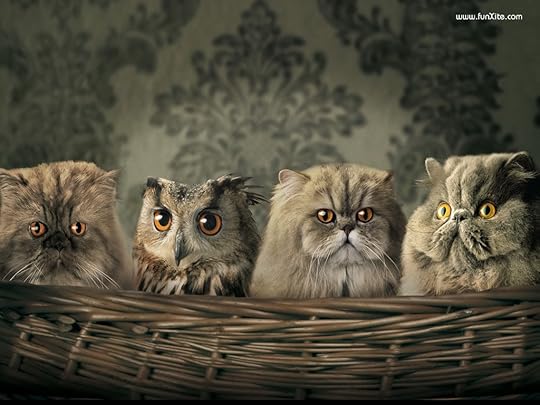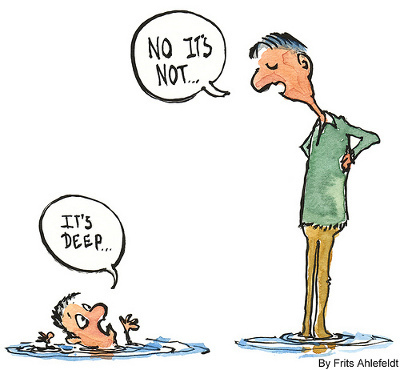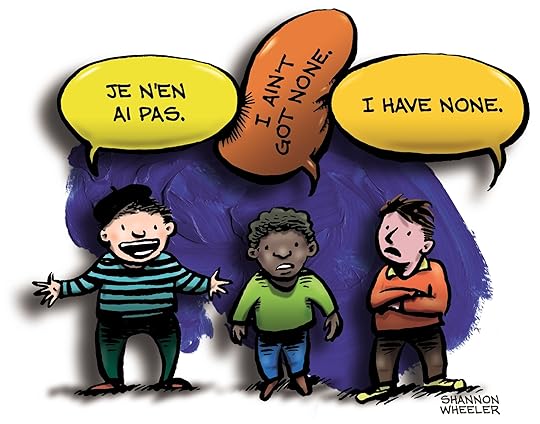S.B. Stewart-Laing's Blog, page 12
December 24, 2013
Merry Christmas!
Published on December 24, 2013 03:36
December 20, 2013
There's Gonna Be Consequences
"'...and then Jack chopped down the beanstalk, adding murder and ecological vandalism to the theft, enticement and tresspass charges already mentioned, but he got away with it and lived Happily Ever After without so much as a guilty twinge about what he had done. Which proves that you can be excused just about anything if you're a hero, because no one asks inconvenient questions.'"
--Susan Sto Helit, Hogfather
In physics, every action is countered by an equal and opposite reaction. In human behaviour, a similar principle generally applies. Unless, apparently, you're the main character in an adventure story. While there are some cases in which the hero's immunity from punishment is part of the genre, and thus part of the fun (James Bond would be a lot less entertaining if 007 had to stop and fill out paperwork and go to court every time he beat up or killed one of the bad guy's minions), there is also a lot to be said for maintaining realistic consequences.
I think these sorts of 'mayhem as wish fulfillment' characters can only work under certain circumstances. First, we need to establish an in-universe reason they're allowed to kick the bad guy's henchmen out of windows with impunity. For example, 007 has a 'license to kill', and is always on a mission to save the world from the bad guys. Or if a character gets away with all kinds of shinanigans on the job because they're too valuable to fire, they have to demonstrate world-class skills where the audience can see it. Second, it needs to be in a genre which can absorb it. This can either be a genre where a character acting with impunity is a 'necessary weasel', such as action-adventure, or a genre which embraces exaggeration for fun and profit. There is absolutely nothing wrong with this-- I've argued a number of times on this blog that 'fluff' entertainment is important because it allows us pure, enjoyable escapism.
If you're not writing in those genres, however, it's a good idea to make sure your characters aren't off the hook. The consequences don't necessarily need to be physical. Emotional consequences-- like losing someone's trust or causing friction in a group-- can be just as integral to the plot.
--Susan Sto Helit, Hogfather
In physics, every action is countered by an equal and opposite reaction. In human behaviour, a similar principle generally applies. Unless, apparently, you're the main character in an adventure story. While there are some cases in which the hero's immunity from punishment is part of the genre, and thus part of the fun (James Bond would be a lot less entertaining if 007 had to stop and fill out paperwork and go to court every time he beat up or killed one of the bad guy's minions), there is also a lot to be said for maintaining realistic consequences.
I think these sorts of 'mayhem as wish fulfillment' characters can only work under certain circumstances. First, we need to establish an in-universe reason they're allowed to kick the bad guy's henchmen out of windows with impunity. For example, 007 has a 'license to kill', and is always on a mission to save the world from the bad guys. Or if a character gets away with all kinds of shinanigans on the job because they're too valuable to fire, they have to demonstrate world-class skills where the audience can see it. Second, it needs to be in a genre which can absorb it. This can either be a genre where a character acting with impunity is a 'necessary weasel', such as action-adventure, or a genre which embraces exaggeration for fun and profit. There is absolutely nothing wrong with this-- I've argued a number of times on this blog that 'fluff' entertainment is important because it allows us pure, enjoyable escapism.
If you're not writing in those genres, however, it's a good idea to make sure your characters aren't off the hook. The consequences don't necessarily need to be physical. Emotional consequences-- like losing someone's trust or causing friction in a group-- can be just as integral to the plot.
Published on December 20, 2013 01:04
December 18, 2013
...But It Might Be This Guy
Deliberately creating a character in some variation of the 'loser' mold can yield good comic and dramatic results. Accidentally writing an incompetent and possibly unlikeable character, not so much.
Ironically, the leading source of these characters appears to be authors attempting to create protagonists who are easy to relate to and/or awesome. Having created (and deleted) a good number of annoying characters myself, and encountered a surprising number in mainstream works, I think there are a variety of precipitating factors, which may occur alone or together:
The author is attached to their characters and can't bear to allow them to mess up, or excuses all of their actions;The author has been bombarded from every creative writing manual/class/blog ever with the message that characters must have flaws... and overdoes it;The author wants to give the character a rich internal life and overshoots the mark, giving disproportionate emotional responses to ordinary life events*
While a old-fashioned Mary Sue can be simply bland-- examples include characters who are totally defined by their superpowers or their love interests or their generic 'good guy-ness''*--these characters are actively grating. And unlike deliberately written obnoxious characters, the consequences of their behaviour doesn't drive the plot-- in fact, they're usually given a pass for no apparent reason. Other key characteristics include (but are unfortunately not limited to):
Double standards for bad behaviour, which are enforced by the story's 'objective' reality;Lack of concern for the well-being of other characters who are supposed to be their friends;Entitlement;Is a burden for the other characters by causing trouble, needing to be rescued, etc;No sense of perspective (ie, their trivial problems outweigh the real problems around them);Unpleasant attitudes about other characters that aren't justified by the secondary character's actions;Lack of discernible useful skills
The first and last items are particularly important. We can enjoy watching a fictional jerk get a comic comeuppance out of sheer schadenfreude, our innate sense of justice, or because we can enjoy their misfortunes without guilt due to their bad behaviour. There is also a level of wish-fulfillment attached to seeing a character do the amusing but unacceptable things we secretly wish we could get away with, such as witty insults or mean pranks directed at the people who get under our skin on a daily basis. We can also invest in a character who is antisocial but incredibly skilled, be they villains who make evil look oh-so-cool or anti-heroes who do good while snarking the whole way. But if a character is the trifecta of anti-social, incompetent, and a karma houdini, they will rub lots of readers the wrong way.
*If your character has a personality disorder, is in a high-stress environment, or for whatever other reason is a drama llama (as acknowledged by other characters), don't mind me.
**One reason I can't really muster a rant about James Fenimore Cooper is that while the concept of a white Gary Stu among Native Americans is offensive, in reality Natty is just a rather forgettable cookie-cutter good dude, if a bit long on the super-special skills.
Ironically, the leading source of these characters appears to be authors attempting to create protagonists who are easy to relate to and/or awesome. Having created (and deleted) a good number of annoying characters myself, and encountered a surprising number in mainstream works, I think there are a variety of precipitating factors, which may occur alone or together:
The author is attached to their characters and can't bear to allow them to mess up, or excuses all of their actions;The author has been bombarded from every creative writing manual/class/blog ever with the message that characters must have flaws... and overdoes it;The author wants to give the character a rich internal life and overshoots the mark, giving disproportionate emotional responses to ordinary life events*
While a old-fashioned Mary Sue can be simply bland-- examples include characters who are totally defined by their superpowers or their love interests or their generic 'good guy-ness''*--these characters are actively grating. And unlike deliberately written obnoxious characters, the consequences of their behaviour doesn't drive the plot-- in fact, they're usually given a pass for no apparent reason. Other key characteristics include (but are unfortunately not limited to):
Double standards for bad behaviour, which are enforced by the story's 'objective' reality;Lack of concern for the well-being of other characters who are supposed to be their friends;Entitlement;Is a burden for the other characters by causing trouble, needing to be rescued, etc;No sense of perspective (ie, their trivial problems outweigh the real problems around them);Unpleasant attitudes about other characters that aren't justified by the secondary character's actions;Lack of discernible useful skills
The first and last items are particularly important. We can enjoy watching a fictional jerk get a comic comeuppance out of sheer schadenfreude, our innate sense of justice, or because we can enjoy their misfortunes without guilt due to their bad behaviour. There is also a level of wish-fulfillment attached to seeing a character do the amusing but unacceptable things we secretly wish we could get away with, such as witty insults or mean pranks directed at the people who get under our skin on a daily basis. We can also invest in a character who is antisocial but incredibly skilled, be they villains who make evil look oh-so-cool or anti-heroes who do good while snarking the whole way. But if a character is the trifecta of anti-social, incompetent, and a karma houdini, they will rub lots of readers the wrong way.
*If your character has a personality disorder, is in a high-stress environment, or for whatever other reason is a drama llama (as acknowledged by other characters), don't mind me.
**One reason I can't really muster a rant about James Fenimore Cooper is that while the concept of a white Gary Stu among Native Americans is offensive, in reality Natty is just a rather forgettable cookie-cutter good dude, if a bit long on the super-special skills.
Published on December 18, 2013 01:49
December 16, 2013
This Loser Isn't You...
 In general, I'm a big fan of ordinary characters, particularly in speculative fiction. After all, it's much more satisfying to see someone who could, on some level, be us face down a challenge equipped only with their wits, their knowledge of the company ventilation system, and power of friendship, rather than just smashing the threat with superpowers. Plus it's much easier to develop a genuinely suspenseful conflict where the odds are stacked against the protagonist. This probably has a lot to do with Batman's enduring popularity-- under the mask and all the cool gadgets, he's just a guy with a sharp brain and a single-minded vendetta, and a small part of us thinks that with access to the gear in the Batcave, we too could be that awesome.
In general, I'm a big fan of ordinary characters, particularly in speculative fiction. After all, it's much more satisfying to see someone who could, on some level, be us face down a challenge equipped only with their wits, their knowledge of the company ventilation system, and power of friendship, rather than just smashing the threat with superpowers. Plus it's much easier to develop a genuinely suspenseful conflict where the odds are stacked against the protagonist. This probably has a lot to do with Batman's enduring popularity-- under the mask and all the cool gadgets, he's just a guy with a sharp brain and a single-minded vendetta, and a small part of us thinks that with access to the gear in the Batcave, we too could be that awesome.But of course it's also possible to take a good thing too far. In fairly recent times, the ordinary protagonist has spawned the loser protagonist, sometimes to the point of turning them into an irredeemably unlikeable disaster zone. While this trope isn't lethal to your story in either flavour, it's a tricky one to execute well.
Comedy is probably the natural habitat of the unlikeable disaster zone protagonist. From A Confederacy of Dunces to Seinfeld, we're laughing at these characters, especially when their misfortunes are their own fault. Even if that's not strictly the case, and unpleasant character can still generate humourous situations, particularly in dark or absurdist comedy.
Another common route is to have the character develop and pull themselves together over the course of the story. It doesn't need to be a full makeover, but progress and a determination to change. For the audience, this is both an endearing trait-- we admire people working hard to better themselves-- and aspirational, since we've somewhat identified with the character.
A third option is a character whose appealing traits balance out their 'loser' ones. Again, comedies are the natural habitat of characters such as Jay and Silent Bob, or Sean Spencer from Psych. These characters are essentially kind, likeable and amusing people who are also lacking in motivation, courage, or clean clothes. But they show enough good qualities that we empathise and enjoy their fictional company.
Published on December 16, 2013 03:22
December 13, 2013
Are All Representations Equal?
 My other half is a big fan of the mystery-comedy Psych, which I'd recommend as a genuinely feel-good fun series. The other day, however, she commented that there's one episode that left her feeling a bit uncomfortable.
My other half is a big fan of the mystery-comedy Psych, which I'd recommend as a genuinely feel-good fun series. The other day, however, she commented that there's one episode that left her feeling a bit uncomfortable.[Spoilers ahoy! Click through for the rest of the post]
The storyline in question features a lesbian senior citizen who becomes romantically fixated on her housemate, and deals with this by killing off the housemate's potential suitors. My Lady Friend said that it was bad form for an otherwise good show to haul out a 'psycho lesbian' storyline, especially since this trope is about as persistent as it's offensive. I wasn't totally persuaded, and pointed out that the show is (by the requirements of its genre) heavily populated with people who think murder is an awesome solution-- in fact, an episode from the same season featured a straight woman killing off the love interests of the male object of her obsession.
My Lady Friend thought about that argument for second. 'No,' she said. 'The problem is there's lots and lots of totally normal straight people on the show, but that murdering old lady is the only gay one.'
She definitely hit the nail on the head. The core problem with having a character be the lone representative of their 'in-group'-- men, Nigerians, asexuals, deaf people, maths professors, Buddhists, or whoever-- their actions become much more loaded. By dint of having no context, these characters become the Authorial View on Group X, or even the In-Universe Facts About Group X. Group X doesn't even have to represent a minority or a marginalised group in the real world, although the impact may be a bit lessened.
One solution, which appears somewhat regularly, is to have the main cast be so diverse that everyone becomes the lone representative of their group. When there is no background 'default', every character becomes more clearly unique, rather than simply an exception to the 'norm'. The original Star Trek got good mileage out of this method, as have a number of other shows set in diverse environments.
Another solution, which works better for stories which will have a majority 'norm' due to the constraints of the setting, is to make sure the minority character doesn't go it alone. This doesn't necessarily mean saturating the main cast--
Published on December 13, 2013 02:39
December 11, 2013
It Meant Something to Me
 This morning, a friend forwarded me a photo essay on microagressions. While the photo essay is good in it's own right (as is the site that inspired it), something else jumped out at me:
This morning, a friend forwarded me a photo essay on microagressions. While the photo essay is good in it's own right (as is the site that inspired it), something else jumped out at me:Often, they are never meant to hurt - acts done with little conscious awareness of their meanings and effects.The statement isn't just applicable to microagressions, or even to negative interactions. In fact, I think there is often an imbalance in how significant an interaction is to the different parties involved.
In fiction, there is a tendency to ascribe a single level of significance to an event. After all, we know as the author if something is important. Readers are also quite trope savvy from a lifetime of storytelling culture, and are good at spotting plot-relevant details.
The characters, however, don't have these meta insights. They ascribe meaning to words and actions based on context, including their relationship with the other character, their life experiences, and their feelings at the moment. What might be a throwaway comment to one character might be interpreted by another as genuinely inspiring words or encouragement, or confirmation of a simmering suspicion, or a stinging verbal cut.
This difference in interpretations is a credible source of miscommunications and conflict between characters without having to resort to a contrived 'big misunderstanding' plot. Even if the plot doesn't hinge on it, these moments can be crucial pieces of character development, and even give some insight into the social dynamics of your world.
Published on December 11, 2013 02:15
December 9, 2013
Leading the Way
Last week, the world lost one of it's iconic leaders and human rights activists. Even if you honour Mandela's request to remember him as a human being with human failings, his ability to inspire reached far beyond his native South Africa. These larger-than-life men and women are rare, but powerful in our collective consciousness as reminders of the human ability to do good on a grand scale.
It's not surprising that many authors-- particularly those writing high fantasy-- try to write a character who takes the role of a charismatic rebel who leads their people towards a better society, usually by ousting the Evil Overlord. Unfortunately, it's frequently unclear why anyone besides the author would follow these characters into danger. While the cause may be worthy cause, mass movements are often most successful when a small number of people help articulate the key goals.
I think one part of the problem is that many characters use violence as a first resort. While force is sometimes, sadly, the only feasible answer, many of history's most respected leaders have been explicitly peaceful. Furthermore, a character who sparks a movement of passive resistance against an oppressive Dark Lord has the moral high ground, which is not true of the one who runs in weapon-first unless they have exhausted all their other options.
Second, it's important to introduce the scale of the leader's goals. While it's fairly easy to inspire people to rally against something (random people prod the Internet Outrage Machine into action approximately once a minute), it takes a true visionary to rally people to build something better. Try writing a character who doesn't just want to kick the Evil Overlord's butt, but rather wants to construct a more equal, more prosperous society and convinces others to join them.
It's not surprising that many authors-- particularly those writing high fantasy-- try to write a character who takes the role of a charismatic rebel who leads their people towards a better society, usually by ousting the Evil Overlord. Unfortunately, it's frequently unclear why anyone besides the author would follow these characters into danger. While the cause may be worthy cause, mass movements are often most successful when a small number of people help articulate the key goals.
I think one part of the problem is that many characters use violence as a first resort. While force is sometimes, sadly, the only feasible answer, many of history's most respected leaders have been explicitly peaceful. Furthermore, a character who sparks a movement of passive resistance against an oppressive Dark Lord has the moral high ground, which is not true of the one who runs in weapon-first unless they have exhausted all their other options.
Second, it's important to introduce the scale of the leader's goals. While it's fairly easy to inspire people to rally against something (random people prod the Internet Outrage Machine into action approximately once a minute), it takes a true visionary to rally people to build something better. Try writing a character who doesn't just want to kick the Evil Overlord's butt, but rather wants to construct a more equal, more prosperous society and convinces others to join them.
Published on December 09, 2013 01:54
December 6, 2013
Dream Destination Blog Hop
Speculative fiction authors Julie Flanders and Lexa Cain are hosting a blog hop, asking us all to think about our dream vacation destinations.

Usually, I'm into the northern climes, and think about places like Nova Scotia, Iceland, or northern Japan. But today the wind is roaring outside, and the rain is trying to get in the windows, and I'm thinking more tropical.
 Western coast of Dominica, August 2009
Western coast of Dominica, August 2009
Several years ago, I got to work in the Caribbean island of Dominica. It's a volcanic island covered with lush tropical forest and surrounded by coral reefs. Although my Amerindian ancestors are Kali'na (Carib) from northern Venezuela and Curaçao, our tribe does extend up the Antillies to Dominica, where a relatively large population remains. However, since I've already visited (and totally loved) Dominica, and Venezuela is working some things out, I'd love to go to Curaçao.

While I don't speak Dutch, most of the area is multilingual, so I think I'd get on fine. Furthermore, I'd probably just flop on one of the white sand beaches and enjoy the sunshine and scenery and not actually do any further tourist activities.

Usually, I'm into the northern climes, and think about places like Nova Scotia, Iceland, or northern Japan. But today the wind is roaring outside, and the rain is trying to get in the windows, and I'm thinking more tropical.
 Western coast of Dominica, August 2009
Western coast of Dominica, August 2009Several years ago, I got to work in the Caribbean island of Dominica. It's a volcanic island covered with lush tropical forest and surrounded by coral reefs. Although my Amerindian ancestors are Kali'na (Carib) from northern Venezuela and Curaçao, our tribe does extend up the Antillies to Dominica, where a relatively large population remains. However, since I've already visited (and totally loved) Dominica, and Venezuela is working some things out, I'd love to go to Curaçao.

While I don't speak Dutch, most of the area is multilingual, so I think I'd get on fine. Furthermore, I'd probably just flop on one of the white sand beaches and enjoy the sunshine and scenery and not actually do any further tourist activities.
Published on December 06, 2013 02:31
December 4, 2013
Be More Specific
 In writing historical or speculative fiction (or something that is essentially both!), you are tasked with bringing the reader into your world. It's up to you to show them the sights, scents, tastes, sounds, and textures of your setting. This can be a daunting task, especially when you're trying to move the plot along without major descriptive interludes.
In writing historical or speculative fiction (or something that is essentially both!), you are tasked with bringing the reader into your world. It's up to you to show them the sights, scents, tastes, sounds, and textures of your setting. This can be a daunting task, especially when you're trying to move the plot along without major descriptive interludes.What Michael and I have learned via trial and error (and a lot of getting on each other's case about descriptive info-dumps) is that specific details go a long way. A character who laces up riding boots or slides on beaded slippers presents a more evocative image than someone simply 'putting on shoes'. Simply taking care to use specific nouns, verbs and a few well-chosen adjectives can allow you to build your world with minimal breaks for pure description.
You can also sneak in extra information by using a combination of descriptive tidbits and character reactions. For example, a quick sentence in which your barefoot main character sees someone in stylish shoes and briefly covets them tells us about fashions, social class, status symbols, and your character's place in this world, all in a handful of words.
What characters don't comment on or react to is also just as powerful as what they do notice as unusual. If your character presents their magic wand for inspection at airport checkpoint with nothing more than a sigh about the security queues, that immediately tells us your character lives in a world where magic is a part of everyday life (and also that the TSA is not impressed).
Published on December 04, 2013 02:48
December 2, 2013
Dialect: Not Code for 'Stupid'
 One day, when I was working on my postgrad degree, the heat went out in our building. A student from the adjacent lab poked her head in, and asked if I could call maintenance, because, as she put it, I 'speak fluent repairman'.
One day, when I was working on my postgrad degree, the heat went out in our building. A student from the adjacent lab poked her head in, and asked if I could call maintenance, because, as she put it, I 'speak fluent repairman'.Sadly, I do not possess any superpowers that cause maintenance workers to rush to my aid. She actually meant that I can speak Central Scots, which these days is spoken most regularly by those from a working-class background. As I got off the phone, she commented: 'It's a good thing I know you from the lab, or I'd think you were kind of dumb.'
There it was-- the assumption that speaking something other than flawless Standard English indicates stupidity. This prejudice has been well-documented, with speakers of African American Vernacular English (AAVE) being particularly targeted in the United States.
In fiction, this prejudice can be amplified when dialects are represented selectively in text. Often, characters with whom the author identifies are presented as speaking Standard English when they would not realistically do so, and represents characters from different backgrounds as speaking in dialect. Usually, this means the characters from poor and working-class backgrounds, and/or characters of colour, get heavily accented dialogue in 'inferior' forms of English, in contrast to (middle-class, Anglo-western) characters who speak like university lecturers.
While I don't advocate erasing regional speaking patterns-- they are a vital part of portraying character and setting-- it is worth giving thought to how those variations are distributed. If only side characters who are there to prop up/fawn over the main character speak in anything but Standard English, you may have a problem. There isn't a magic line to determine if you're using dialect as code for 'stupid' or 'inferior', but take a good look at your characters and their context to see what else is being conveyed besides someone's pattern of speech.
Published on December 02, 2013 02:15




